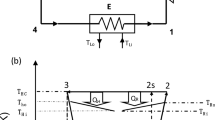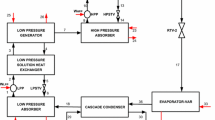Abstract
The new thermo-ecological optimization of an absorption system for cooling applications operating between three temperature levels with the linear phenomenological heat transfer law of \(\dot{Q}\alpha\Delta( T^{ - 1} )\) has been performed by taking account the losses of heat resistance, internal irreversibility and leakage. The considered objective function is the ecological coefficient of performance (ECOP) and is defined as the cooling load per unit loss rate of availability. The comparative analysis with the ecological optimization criterion (E) defined in the literature and also with the cooling load optimization criterion (R) has been carried out to prove the utility of the new thermo-ecological optimization criterion (ECOP) for three-heat-source refrigerators with linear phenomenological heat transfer law. The results show that the three-heat-source refrigeration cycle working at maximum ECOP conditions has a significant advantage in terms of entropy production rate and coefficient of performance over the maximum E and maximum R conditions. The obtained results may provide a general theoretical tool for the thermo-ecological design of absorption refrigerator.
Similar content being viewed by others
Abbreviations
- A :
-
Total heat-transfer area (m2)
- A A :
-
Heat-transfer area of absorber (m2)
- A C :
-
Heat-transfer area of condenser (m2)
- A CA :
-
=A A +A C
- A E :
-
Heat-transfer area of evaporator (m2)
- A G :
-
Heat-transfer area of generator (m2)
- COP :
-
Coefficient of performance
- ECOP :
-
Ecological coefficient of performance
- I :
-
Internal irreversibility parameter
- K L :
-
Heat leak coefficient (W K)
- \(\dot{Q}_{A}\) :
-
Heat reject load from absorber to heat sink (W)
- \(\dot{Q}_{C}\) :
-
Heat reject load from condenser to heat sink (W)
- \(\dot{Q}_{CA}\) :
-
\(= \dot{Q}_{C} +\dot{Q}_{A}\)
- \(\dot{Q}_{E}\) :
-
Heat input load from cooled space to evaporator (W)
- \(\dot{Q}_{G}\) :
-
Heat input load from heat source to generator (W)
- R :
-
Cooling load (W)
- T 1 :
-
Temperature of working fluid in generator (K)
- T 2 :
-
Temperature of working fluid in evaporator (K)
- T 3 :
-
Temperature of working fluid in absorber and condenser (K)
- T A :
-
Temperature of the absorber-side heat sink (K)
- T C :
-
Temperature of the condenser-side heat sink (K)
- T CA :
-
=T A =T C
- T E :
-
Temperature of the evaporator-side heat source (K)
- T G :
-
Temperature of the generator-side heat source (K)
- U CA :
-
Overall heat-transfer coefficient of absorber and condenser (W K/m2)
- U E :
-
Overall heat-transfer coefficient of evaporator (W K/m2)
- U G :
-
Overall heat-transfer coefficient of generator (W K/m2)
- λ :
-
Dissipation coefficient of cooling rate
- σ :
-
Entropy generation rate (W/K)
- τ 1 :
-
Source temperature ratio (T G /T CA )
- τ 2 :
-
Source temperature ratio (T E /T CA )
- ε r :
-
Coefficient of performance for reversible three-heat-source refrigerator
- max:
-
Maximum
- me :
-
Maximum ecological-function condition
- mr :
-
Maximum cooling load condition
- ∗:
-
Maximum ecological coefficient of performance condition
References
Bejan, A.: Entropy Generation Through Heat and Fluid Flow. Wiley, New York (1982)
Sieniutycz, S., Shiner, J.S.: Thermodynamics of irreversible processes and its relation to chemical engineer: second law analyses and finite time thermodynamics. J. Non-Equilib. Thermodyn. 19(4), 303–348 (1994)
Bejan, A.: Entropy generation minimization: the new thermodynamics of finite-size device and finite-time processes. J. Appl. Phys. 79(3), 1191–1218 (1996)
Chen, L., Wu, C., Sun, F.: Finite time thermodynamic optimization or entropy generation minimization of energy systems. J. Non-Equilib. Thermodyn. 24(4), 327–359 (1999)
Berry, R.S., Kazakov, V.A., Sieniutycz, S., Szwast, Z., Tsirlin, A.M.: Thermodynamic Optimization of Finite Time Processes. Wiley, Chichester (1999)
Bejan, A., Lorente, S.: Thermodynamic optimization of flow geometry in mechanical and civil engineering. J. Non-Equilib. Thermodyn. 26(4), 305–354 (2001)
Yan, Z., Chen, S.: Finite time thermodynamic performance bound of three-heat-source refrigerators. Chin. Sci. Bull. 31(10), 718 (1986) (in Chinese)
Yan, Z.: A three-heat-reservoir endoreversible absorption refrigeration cycle. Vac. Cryog. 8(3), 8–12 (1988) (in Chinese)
Yan, Z., Chen, J.: An optimal endoreversible three-heat-reservoir refrigerator. J. Appl. Phys. 65(1), 1–4 (1989)
Goktun, S.: Optimal performance of an irreversible refrigerator with three heat sources. Energy 22(1), 27–31 (1997)
Bejan, A., Vargas, J.V.C., Sokolov, M.: Optimal allocation of a heat exchanger inventory in heat driven refrigerators. Int. J. Heat Mass Transf. 38(16), 2997–3004 (1995)
Sokolov, M., Vargas, J.V.C., Bejan, A.: Thermodynamic optimization of solar-driven refrigerators. Trans. ASME J. Sol. Energy Eng. 118(2), 130–135 (1996)
Chen, J., Wu, C.: The R–ε characteristics of a three-heat-source refrigeration cycle. Appl. Therm. Eng. 16(10), 901–905 (1996)
Baustita, O., Mendez, F., Cervantes, J.G.: An endoreversible three heat source refrigerator with finite heat capacities. Energy Convers. Manag. 44, 1433–1449 (2003)
Baustita, O., Mendez, F.: General performance of an irreversible three heat source refrigerator. Energy Convers. Manag. 46, 433–449 (2005)
Grosu, L., Feidt, M., Benelmir, R.: Study of the improvement in the performance coefficient of machines operating with three reservoirs. Int. J. Exergy 1, 147–162 (2004)
Han, W., Zhang, G., Ma, Y., Li, Z., Chen, J., Qian, Y.: Finite-time thermodynamic analysis of an irreversible refrigerator with three heat sources. Shanghai Energy Conserv. 10 (2010) (in Chinese)
Kodal, A., Sahin, B., Ekmekci, I., Yilmaz, T.: Thermoeconomic optimization for irreversible absorption refrigeration and heat pumps. Energy Convers. Manag. 44(1), 109–123 (2003)
Wu, S., Lin, G., Chen, J.: Optimum thermoeconomic and thermodynamic performance characteristics of an irreversible three-heat-source heat pump. Renew. Energy 30, 2257–2271 (2005)
Chen, L., Sun, F., Chen, W.: Analysis of the COP of three-heat-reservoir absorption refrigeration. Vac. Cryog. 9(2), 30–33 (1990) (in Chinese)
Chen, L., Sun, F., Chen, W.: Optimal performance coefficient and cooling load relationship of a three-heat-reservoir endoreversible refrigerator. Int. J. Electr. Power Energy Syst. 17(3), 206–208 (1997)
Chen, L., Li, Y., Sun, F., Wu, C.: Optimal performance of an irreversible absorption refrigerator with heat transfer law of QαΔ(T −1). Int. J. Exergy 2(3), 167–172 (2002)
Callen, H.B.: Thermodynamics and an Introduction to Thermostatics. Wiley, New York (1985)
Yan, Z., Lin, G.: Ecological optimization criterion for an irreversible three-heat-source refrigerator. Appl. Energy 66, 213–224 (2000)
Huishan, Y.: Optimization of heat transfer areas and ecological optimal performance of a three-heat-source refrigerator with linear phenomenological heat transfer law. Cryogenics 04 (2002) (in Chinese)
Chen, A., Huang, Y., Cai, H.: Ecological criteria optimization for a four-temperature-level absorption refrigerator. Build. Energy Environ. 01 (2008) (in Chinese)
Tao, G., Chen, L., Sun, F., Wu, C.: Optimisation between cooling load and entropy-generation rate of an endoreversible four-heat-reservoir absorption refrigerator. Int. J. Ambient Energy 30(1), 23–32 (2009)
Ust, Y., Sahin, B.: Performance optimization of irreversible refrigerator based on a new thermo-ecological criterion. Int. J. Refrig. 30, 527–534 (2007)
Ust, Y.: Performance analysis and optimization of irreversible air refrigeration cycles based on ecological coefficient of performance criterion. Appl. Therm. Eng. 29, 47–55 (2009)
Ust, Y.: Ecological performance analysis and optimization of power-generation systems. Ph.D., Thesis Progress Report, Yildiz Technical University, Istanbul (2004)
Ngouateu Wouagfack, P.A., Tchinda, R.: Performance optimization of three-heat-source irreversible refrigerator based on a new thermo-ecological criterion. Int. J. Refrig. 34, 1008–1015 (2011)
Author information
Authors and Affiliations
Corresponding author
Rights and permissions
About this article
Cite this article
Ngouateu Wouagfack, P.A., Tchinda, R. Irreversible three-heat-source refrigerator with heat transfer law of QαΔ(T −1) and its performance optimization based on ECOP criterion. Energy Syst 2, 359–376 (2011). https://doi.org/10.1007/s12667-011-0040-y
Received:
Accepted:
Published:
Issue Date:
DOI: https://doi.org/10.1007/s12667-011-0040-y




